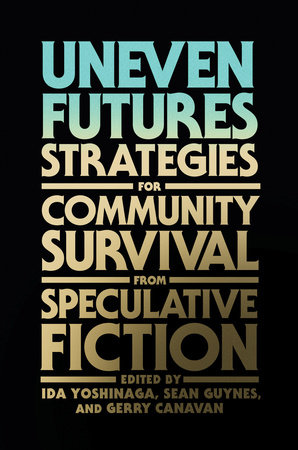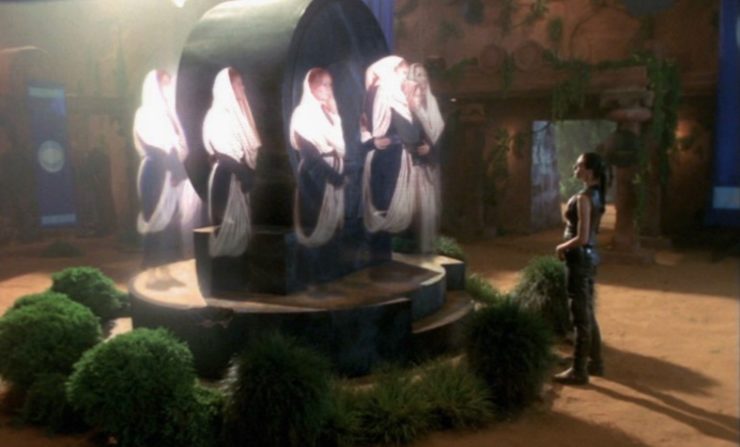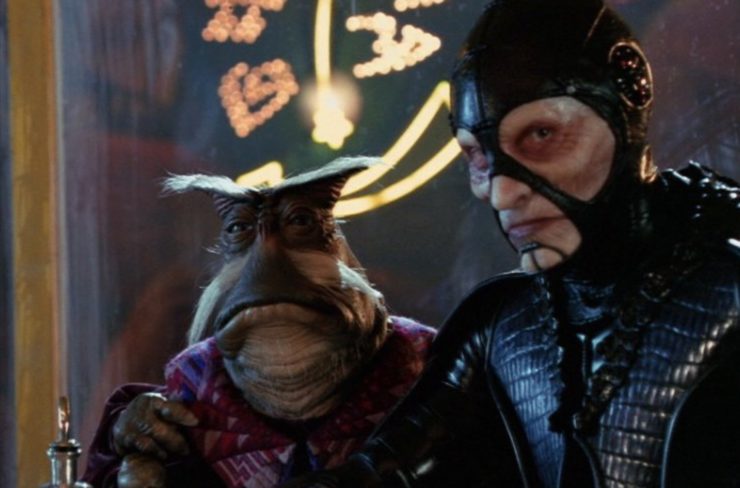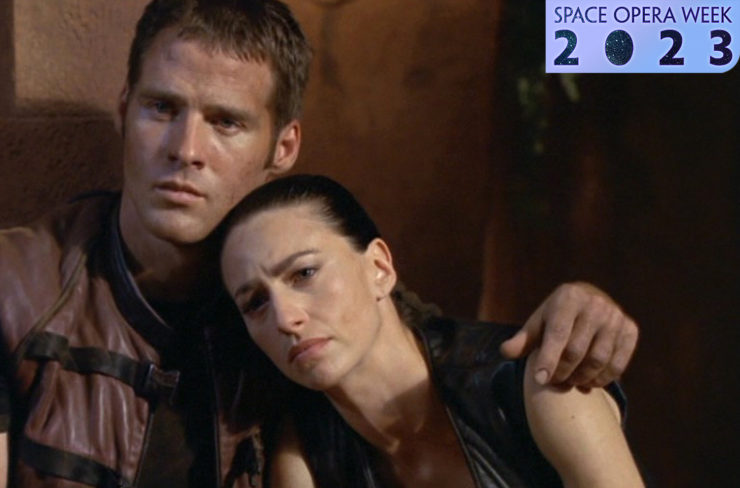There’s a simple selling point I trot out when trying to get anyone to watch Farscape, and I think it still hits the mark nearly twenty years after its finale: “Imagine you were watching Star Trek, but this time, instead of your intrepid spacefarers helping people wherever they went, the crew of the Enterprise ruined everything all the time.”
It’s an important framing because shows like Farscape inevitably exist in conversation with Trek, which dominated the entertainment landscape in those days. (There were two Star Trek series on the air when Farscape premiered, though Deep Space Nine had nearly completed its seminal run.) So many genre television projects existed to try their hand at the template Trek had built, and their goal was either to mimic the formula (Stargate SG-1, SeaQuest DSV) or upend the conceit entirely (Babylon 5, reboot Battlestar Galactica). Farscape was firmly in the latter camp, and employed several former Trek writers to that end, asking the question: What if no one on the ship ever wanted to be here in the first place?
Buy the Book


Uneven Futures: Strategies for Community Survival from Speculative Fiction
Most shows featuring space travel involve a group of people who chose to be on their respective journeys. Whether they joined a Federation or need to haul cargo to eat, everyone boards their boat for the same or similar reasons—it’s how they make a living. But Farscape begins with an astronaut getting Buck Rogers’d across the galaxy via a wormhole, and arriving mid-battle as a ship of escaped prisoners is breaking free of their captors. Dragged aboard the former prison transport (her name is Moya, she’s alive by the way), he has to contend with the passengers, a disparate group who never had any intention of spending time together once they were free.
As is often the case with these sorts of stories, the crew of Moya somehow weave themselves into a family, forced to see each other through a number of harrowing ordeals as they move across the Uncharted Territories. But one fact of that journey continued to pull me back time and again while I watched the show as a kid: Very often, their interference in the situations they stumbled across made things worse rather than better. They’re meant to be our heroes, imperfect though they may be, yet they are constantly fucking it up.
A perfect example of this dynamic is encapsulated in the episode “…Different Destinations,” an early entry in the show’s third season. Right on the heels of losing a very dear friend, John Crichton (that’s the human astronaut) and several of his cohort are visiting a planet shrine while their ship is undergoing repairs. Said shrine contains these weird temporal goggles that allow visitors to see back through time to a very important battle where thirty Peacekeeper soldiers died to defend kids and nurses from the Venek Horde, and eventually created terms for a ceasefire. This is already awkward on the propaganda front as the Peacekeepers of the current era are a purely fascistic force bent on galactic conquest, but things get trickier when their pal Stark has the goggles forcibly jammed on his head—they thought he’d enjoy a look at peace, you see—and Stark’s unique empathic spiritual abilities wind up shoving his friends back through time to the battle itself.
The instant they arrive in the past, their friends in the present note changes to the planet. Whoops.
While the group in the past are keenly aware that their actions might change the future, every attempt to avoid that scenario fails. This is partly down to causality making it fairly impossible for them not to muck things up, but is also entirely down to everyone acting on their emotions: Jool is injured the second she arrives and spends all of her time in screaming pain, frantic to leave; Aeryn learns that the historical Peacekeeper hero Sub-Officer Dacon was no dutiful soldier, but a cook promoted due to circumstance, and she immediately wants to protect him from his fate; D’Argo makes a connection with a young child named Kelsa, who he also wishes to protect; Crichton keeps trying to recreate the original ceasefire and botching it in ever more subtle ways.
Every alteration to the timeline manufactures a worse situation in the present—the planet is run by the Venek Horde, then it’s a decimated, lifeless surface, then it’s irradiated, and finally it vanishes from existence. Not a single attempt to put things right results in a better or even restored version of events.
When the crew finally make it back to the present, the shrine is there once more, but erected to an entirely different purpose: No longer the site of a peaceful end to conflict, it now exists as a monument to the murdered nurses and children. When you look through time in those temporal goggles, you can hear one of them screaming for Crichton, who had assured the group that, if they left, their lives would no longer be in danger. Everyone is traumatized by what they went through, and angry at how their presence once again led to violence and death for people they barely knew—it’s hardly the first time this has happened.

Time travel stories like this are often little puzzle boxes, a fun exercise for a writer to conceive of a few cute paradoxes that can link up in the end for a tidy completion. But in Farscape, it was used to the polar opposite purpose. There is no puzzle box. There is no neat resolution. There is no quick fix to a wildly difficult problem. There is only the aftermath of your own poor choices, even when you tried as hard as you could.
This is one of the more extreme examples, but it happens constantly throughout the course of the series. Zhaan helps to ween a stranger off a super-soldier drug, only to have him elect to use the drug again immediately after he parts company with her. Stark attempts to free a group of his own enslaved people, and instead they’re killed. Scorpius and Rygel interrupt a cook’s attempt to burn his diner down for insurance money, leading to his death instead. The crew’s errors cause Moya to conceive a Peacekeeper-Leviathan hybrid ship, and then to later lose Moya’s child to a Peacekeeper captain. They eventually gain a reputation as harbingers of destruction who are capable of outrageous feats by the sheer volume of their own massive screw ups. But the specter of their consistent failures follow, often fragmenting their little family as everyone tries to handle heartbreak and loss as best they can.
And yes, this is a large part of what makes the show incredible. A key factor in its appeal, if you will.
I’m not so edgy as to tell anyone that a withholding of comfort and solutions leads to better storytelling. It’s more surprising, certainly, but I don’t subscribe to the suggestion that a lack of safety in fiction is better by virtue of surprise alone. It can become its own manner of trope for one (how many murder weddings can we fit into one historical era, Westeros), and the idea that art always has to shake us up in order to be truly meaningful is exhausting and also, more importantly, false. We can learn a lot from quiet decency and softer bravery. You don’t have to be traumatized in order to learn or experience something transformative.
However… it is a fact of life that the majority of us will spend our days fucking up. Not because we’re terrible people, but because it’s an inevitable side effect of being here. And popular fiction can often have a hard time showcasing that aspect of life in a way that feels true.
I needed Farscape to show me that side of the equation. I needed to know that it was common to try and common to fail. And I needed to know that when I failed, a nice captain-type wouldn’t be there to tell me that making mistakes and still losing were a part of life—that instead, I might just be non-functional for a few days. I might forget how to speak, I might scream into empty vast nothingness, I might have long conversations with a neural clone of my worst enemy (i.e. an imaginary friend who gives you terrible advice) in my own head about how wrong I’ve been. I might break and everyone around me might be broken, too. I needed to know that we’d keep going all the same because that’s what you do, and often for no reason more profound than that.

And I also needed to know that sometimes fucking up could be fun. Or, at the very least, that the absurdity of existence would never fail to be funny. John Crichton saved himself from a coma by self-inserting into his favorite childhood cartoons. He accidentally swapped consciousnesses with his fellow shipmates and got to spend time inhabiting the body of his lover. He taught a robotic repair drone on a dying ship to hum the 1812 Overture. He was swallowed by a budong and got the thing to vomit him up. He became the most wanted man in the galaxy, surrounded by aliens strapped into leather fetish gear. You know, just the usual profligate madness that pops up all over the place when life does its thing.
So you see, I describe Farscape the way I do because I consider it to be the highest compliment: Ruin more things for me, please. We all define hope by different parameters, you know? And for me, there is often nothing so hopeful as proof that nothing ends with failure. Because there’s no way to know how capable you are until everything goes wrong—and you’re still here.
Emmet Asher-Perrin talked about Farscape—the way it taught viewers to cultivate radical empathy and how to build a community that acknowledged and accommodated a wide array of disabilities—in Uneven Futures: Strategies for Community Survival from Speculative Fiction. So you could go grab a copy and read more of their Farscape thoughts, if you like. You can bug them on Twitter and Tumblr, and read more of their work here and elsewhere.










